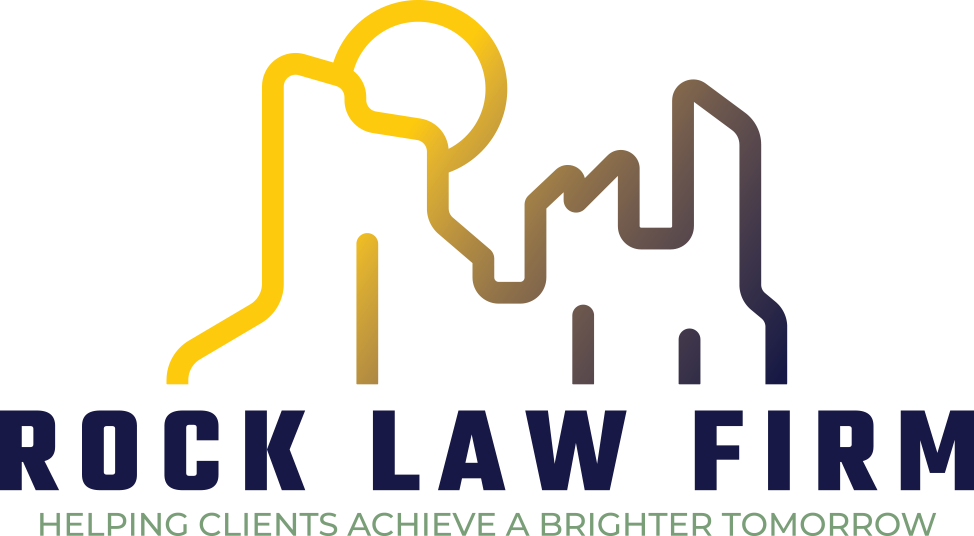
From Debt to Relief: How a Bankruptcy Attorney Can Give You a Fresh Start
Rock Law Firm
Life can take unexpected turns, and sometimes those twists lead us down the path of financial hardship. Mounting debts, creditor calls, and the stress of juggling bills can feel overwhelming. If you find yourself in this situation, a bankruptcy attorney could be your key to regaining control of your financial future and achieving a fresh start. This blog post enlightens you on how bankruptcy attorneys can provide you with a tailored solution for your financial distress, paving the way for a fresh start.
The Role of a Bankruptcy Attorney in Debt Relief
When facing overwhelming financial challenges, seeking the guidance and support of a skilled bankruptcy attorney can be invaluable. A bankruptcy attorney serves as a trusted ally, providing expertise and legal knowledge to navigate the complex landscape of debt relief. Their primary role is to assist individuals in achieving a fresh start by guiding them through the bankruptcy process and helping them understand their rights and options.
One of the key responsibilities of a bankruptcy attorney is assessing your financial situation. They will thoroughly analyze your income, expenses, assets, and debts to determine if filing for bankruptcy is the most appropriate solution for your specific circumstances. This assessment involves evaluating various factors such as the amount of debt owed, the types of debt incurred (including credit card debt, medical bills, or mortgage arrears), and the potential consequences of bankruptcy on your credit score.
In addition to assessing your financial situation, a bankruptcy attorney performs several other crucial tasks during the debt relief process, including:
Providing expert advice: Bankruptcy attorneys possess intricate knowledge of bankruptcy laws and are equipped to offer personalized advice based on your unique circumstances. They can explain complicated legal jargon in understandable terms and guide you through the intricacies of the bankruptcy process.
Navigating paperwork and deadlines: Filing for bankruptcy involves extensive documentation and adherence to specific timelines. An attorney will ensure that all necessary paperwork is completed accurately, minimizing the risk of errors or omissions that could delay or jeopardize your bankruptcy case.
Representing you in court: If legal proceedings are required as part of your bankruptcy case, your attorney will represent you in court. They will advocate on your behalf, present your case to the judge, and handle any disputes or objections raised by creditors or other parties.
Handling communication with creditors: Once you engage a bankruptcy attorney, they will become the primary point of contact for your creditors. This relieves you of the burden of constant phone calls, letters, or other forms of harassment from creditors seeking payment. The attorney will manage all communication with creditors and ensure that your rights are protected throughout the process.
By enlisting the assistance of a bankruptcy attorney, you can rely on their expertise and experience to navigate the complexities of debt relief effectively. Their knowledge of bankruptcy laws and dedication to protecting your best interests can provide you with much-needed peace of mind during a challenging time.
Assessing your financial situation
Before proceeding with any debt relief strategy, it is essential to conduct a comprehensive assessment of your financial situation. This evaluation lays the foundation for developing an effective plan tailored to address your specific needs and challenges.
Assessing your financial situation involves gathering essential information about your income, expenses, assets, liabilities, and outstanding debts. Start by creating a detailed list of all sources of income, including employment earnings, investments, rental properties, or any other supplemental income streams. Be sure to account for both regular and irregular income sources.
Next, list all of your monthly expenses, categorizing them into fixed expenses (such as rent or mortgage payments, utilities, and insurance premiums) and variable expenses (such as groceries, transportation costs, and entertainment). This exercise helps provide a clear picture of your cash flow and identifies areas where you may be able to make adjustments to free up funds for debt repayment.
It's equally important to compile an inventory of your assets, including property, vehicles, investments, retirement accounts, and personal belongings. On the other side of the equation, document all outstanding debts, such as credit card balances, medical bills, student loans, or outstanding tax obligations.
Once you have gathered this essential financial information, consider utilizing online tools or consulting with a bankruptcy attorney to accurately evaluate your financial health. This evaluation will help determine whether bankruptcy is the most suitable option or if alternative debt relief strategies may be more appropriate.
Exploring bankruptcy options
When faced with overwhelming debt and financial hardships, exploring bankruptcy options can offer a ray of hope for individuals seeking a fresh start. Bankruptcy is a legal process that allows debtors to eliminate or restructure their debts, providing them with relief from the burden of unmanageable financial obligations. There are different types of bankruptcy, and understanding which option suits your specific circumstances is critical to making an informed decision.
Chapter 7 bankruptcy, also known as "liquidation bankruptcy," involves the liquidation of non-exempt assets to pay off creditors. This option is suitable for individuals with limited income and significant unsecured debts, such as credit card debt or medical bills. Chapter 13 bankruptcy, on the other hand, enables debtors to create a repayment plan to gradually pay off their debts over a three- to five-year period. This option is ideal for those who have a regular income but need assistance restructuring their debt obligations.
Each type of bankruptcy has its own eligibility requirements and implications, so it's essential to consult with an experienced bankruptcy attorney who can thoroughly evaluate your financial situation and guide you towards the best course of action. They will assess factors such as the nature and amount of your debts, your income, and your assets to determine which bankruptcy option aligns with your goals and provides you with the most favorable outcome.
Furthermore, exploring bankruptcy options involves understanding the potential consequences associated with each choice. While bankruptcy is designed to provide relief to individuals struggling financially, it does have long-term effects on one's creditworthiness. Bankruptcy will appear on your credit report for several years, making it more challenging to obtain loans or secure favorable interest rates in the future.
However, it's important to note that even though bankruptcy may initially have negative repercussions, it also offers an opportunity for a fresh financial start. By eliminating or restructuring your debts through proper legal channels, you can regain control over your finances and work towards rebuilding a solid foundation for a more stable financial future.
The Bankruptcy Process: From Filing to Discharge
The decision to file for bankruptcy is not one to be taken lightly. Understanding the bankruptcy process can help alleviate some of the stress and uncertainties associated with this legal procedure.
The first step in the bankruptcy process is to gather all relevant financial documents, including income statements, tax returns, and a list of assets and liabilities. These documents will be crucial when filling out the necessary forms, such as the petition and schedules, which provide detailed information about your financial situation.
Once all the required paperwork is completed, you will need to file your bankruptcy petition with the appropriate bankruptcy court. This initiates an automatic stay, which halts any collection actions or lawsuits brought against you by creditors. It's important to note that working with an experienced bankruptcy attorney during this stage can help ensure that all required forms are completed accurately and submitted within specified deadlines.
After filing for bankruptcy, you will be required to attend a meeting of creditors, also known as a 341 meeting. This meeting allows your creditors to ask questions about your financial situation under oath. It's typically a straightforward process, but having legal representation can help prepare you for any potential inquiries that may arise.
Following the meeting of creditors, if you file for Chapter 7 bankruptcy, the trustee assigned to your case will determine if you have any non-exempt assets that can be sold to repay your creditors. In Chapter 13 cases, the trustee reviews your proposed repayment plan to ensure its feasibility and compliance with bankruptcy laws.
Once all requirements are met and any necessary payments are made according to your agreed-upon plan, you will receive a discharge order from the court. This discharge essentially eliminates your obligation to repay the discharged debts, providing you with the fresh start you seek.
As you can see, the bankruptcy process involves several important steps and relies heavily on legal expertise. Working with an experienced bankruptcy attorney can greatly assist in navigating this complex procedure and ensuring that your rights and interests are protected throughout the process.
Life After Bankruptcy: A Fresh Financial Start
While navigating the bankruptcy process might feel like embarking on a daunting journey, it's essential to remember that it offers the opportunity for a fresh financial start. Despite the challenges associated with bankruptcy, many individuals have emerged from this experience stronger and more financially resilient than before.
One of the primary benefits of bankruptcy is its ability to eliminate or reduce certain types of debt, such as credit card debt, medical bills, and unsecured loans. This provides individuals with the chance to start afresh, unburdened by substantial financial obligations that were previously holding them back.
Another significant advantage of bankruptcy is the automatic stay that goes into effect once the filing is made. This stay immediately halts all collection actions from creditors, including phone calls, letters, wage garnishments, or even potential foreclosure proceedings. This provides individuals with much-needed relief and breathing room to assess their situation and develop a plan for moving forward.
Once the bankruptcy process is complete and individuals have obtained a fresh financial start, it's crucial to approach their newfound freedom with responsibility and purpose. In the next section, we will explore some strategies for thriving after bankruptcy and setting oneself up for long-term financial success.
Contact the Rock Law Firm for bankruptcy consultation
Ready to regain control of your financial future? Look no further than Rock Law Firm, your trusted partner in tackling the complexities of bankruptcy. Our dedicated bankruptcy attorneys, led by the compassionate Jacob Goodman, are here to guide you through every step of the process. Whether it's Chapter 7, Chapter 13, or a tailored solution just for you, we're committed to helping you find the relief you deserve. Don't let debt hold you back; take action today and schedule a free consultation with the Rock Law Firm.
